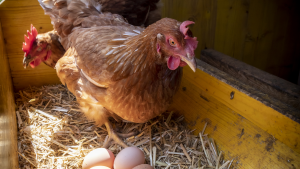Most families tend a small backyard flock for the precious eggs hens generously give each day. Few human foods are as delicious or nutrient packed. Add the pride of caring for productive chickens as a benefit beyond food.
Sometimes problems arise. Once in a while a hen becomes a thief. She’ll eat eggs in the nest, making a mess in the process. It usually starts when a hen spots a cracked or broken egg in the nest, pecks the nutritious contents, and decides it’s a delicious addition to her diet. An egg eater is a parasite that can’t be tolerated.
Prevention always beats a cure. Fortunately, there are many ways to discourage or eliminate egg eating:
Prevention
Anyone keeping a few hens in a backyard coop should realize that, sooner or later, a hen may become an egg eater. Here are some ways to reduce the chances that an egg will get cracked or broken in the nest and tempt a hen to begin a bad habit:
- Put out enough nest boxes. Several hens crowding into one nest is a recipe for a slimy mess of broken eggs. One nest per four hens is about the right ratio, but it never hurts to make more nests available. Adding nests is never a perfect solution. Hens can seem silly, and they often all want to lay their egg in the same nest, even if nearby ones are vacant.
- Line the nest’s bottom with soft, comfy straw or wood chips to cushion eggs. Change it often and always after it becomes soiled. A piece of indoor/outdoor carpet cut to fit the nest bottom also helps cushion eggs and can be washed and reused.
- Add calcium. Eggs laid by young pullets usually have thick shells that can be so strong they’re hard to crack on the edge of a frying pan. The harder and stronger a shell is the less likely it will break in the nest or be pecked open by a hungry hen. Every egg a hen lays removes calcium from her body. Shells tend to get thinner and weaker the longer she lays, and sometimes hot summer weather causes thin shells. Quality layer mash includes added calcium, but it never hurts to buy crushed oyster shells and either place them in a separate small feeder or broadcast a handful now and then in the run or litter.
- Collect eggs often. No hen can eat an egg that has just been collected and is safe in the refrigerator. Collecting eggs a few times a day reduces odds that many eggs will be in the nest at the same time-a common cause of breakage.

The Surefire Solution
A certain way to foil an egg eating hen, while making collection easy is to use roll out nests. These have a sloped bottom. As soon as a hen lays an egg it rolls out of the nest and is caught and held in an exterior tray or basket, making eggs inaccessible to chickens but easy to collect. Some of these roll the eggs backwards outside the coop wall. Others roll eggs forward toward the interior of the coop. Usually the ones that roll outside are most convenient but installation may require cutting a hole in the coop wall. Quality interior rollers have a flap that protects the eggs from pecking hens.
Roll out nests can be purchased from many companies or homemade. Sources and plans can be found on an Internet search.
Curing an Egg Eating Hen
Egg eating is contagious. One hen may begin snacking on a cracked egg and soon her coop mates will also give it a try. Egg eating should be dealt with as soon as it’s detected. Assuming that tips mentioned above aren’t working, there is a direct way to solve the problem-catch her in the act.
It’s not always easy figuring out which hen is the egg eater. That may take hours observing them directly or on a lucky encounter when collecting eggs. When the culprit has been found one way to immediately solve the problem is to declare her a meat chicken. When mingled in with carrots, potatoes and spices in a stew pot she won’t be in the coop breaking and eating eggs. It works, but most families don’t want to take such a drastic step. An alternative is to isolate her. Having a small extra coop available is handy for many flock situations. Isolating the egg eater for a week or two may discourage the habit. Return her to the flock but keep an eye out for further signs of egg eating.
Some experts suggest sprinkling hot pepper powder on a broken egg to discourage eating It might work but a chicken’s sense of smell and taste isn’t well developed so she may not even be aware of the hot spice. Maybe she’ll even like it! It is worth a try, but also beef up calcium, pad the nest bottom, and collect eggs often in an attempt to solve the problem.
Occasionally a hen decides that she wants to eat eggs, rather than letting her human caretaker bring them into the kitchen. It’s a bad habit that should be prevented, if possible, or cured if necessary.